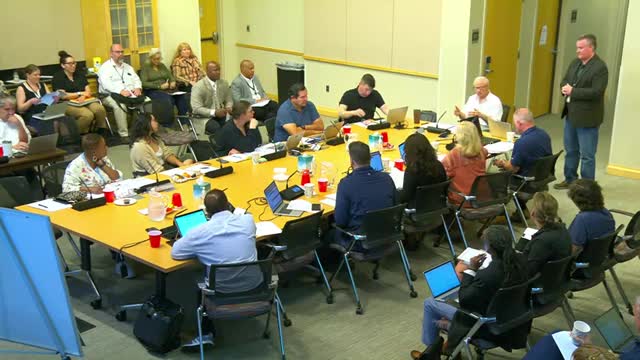Council debates HEART court funding and navigation center rollout; member moves portion of funds to non‑departmental pending demand
October 05, 2025 | Aurora City, Douglas County, Colorado
This article was created by AI summarizing key points discussed. AI makes mistakes, so for full details and context, please refer to the video of the full meeting. Please report any errors so we can fix them. Report an error »

Aurora judges, court administrators, police and councilmembers spent extensive time at the budget workshop discussing HEART court — a new, homelessness‑focused docket tied to the city’s Navigation Campus — and how it differs from the city’s existing wellness and treatment courts.
The city’s HEART team is a targeted enforcement and referral unit staffed by APD officers and court navigators that issues summonses tied to camping, trespass and open‑container locations the city has identified. Judge Day and court staff argued the HEART court brings housing resources to people who are cited by HEART officers and that holding HEART sessions at the Navigation Campus should improve participation rates.
Some councilmembers raised budgetary concerns that HEART appears duplicative of wellness court services, which provide long‑running mental‑health and substance‑use treatment dockets. Council member Coombs proposed moving the budgeted FTE for HEART (one full FTE funded to HEART, and one half‑FTE shared across courts) into non‑departmental pending proof that HEART’s caseload and distinct staffing needs materialize; he said the funding could be restored if actual demand justifies it.
Why it matters: The discussion affects how the city will staff the Navigation Campus and whether general fund personnel are allocated directly to HEART or held centrally until cases appear. Staff told the council HEART will be housed at the Navigation Campus beginning in mid‑November and that they expect the number of HEART summons and participants to increase once the campus opens.
Program details and differences: Court staff said wellness court and HEART serve overlapping but not identical populations. Wellness court historically targeted high‑utilizers of the justice system with multiple prior contacts and a clear focus on behavioral health treatment. HEART eligibility is triggered by contact with the HEART APD team and is oriented toward people experiencing homelessness flagged for trespass, camping or public‑space enforcement; HEART programming includes housing navigation and referrals. The judge and program leads said HEART participants will receive housing resources that wellness court does not prioritize.
Council action and next steps: A motion by Council member Coombs to place one of HEART’s new FTE line items in non‑departmental pending evidence of caseload growth was put "on the board" after five councilmembers indicated support; council members asked for data and a formal review after the Navigation Campus opens and the program ramps up. Judge Day and other court staff urged the council to keep funding in place so the new program can mature, and the council left follow‑up to future budget and supplemental reviews.
Operational notes: Court staff said one attorney is assigned to HEART matters and that initial HEART caseloads were in the dozens but expected to grow. The court has created a dedicated docket slot to handle vehicle‑registration and HEART cases separate from general traffic dockets.
The city’s HEART team is a targeted enforcement and referral unit staffed by APD officers and court navigators that issues summonses tied to camping, trespass and open‑container locations the city has identified. Judge Day and court staff argued the HEART court brings housing resources to people who are cited by HEART officers and that holding HEART sessions at the Navigation Campus should improve participation rates.
Some councilmembers raised budgetary concerns that HEART appears duplicative of wellness court services, which provide long‑running mental‑health and substance‑use treatment dockets. Council member Coombs proposed moving the budgeted FTE for HEART (one full FTE funded to HEART, and one half‑FTE shared across courts) into non‑departmental pending proof that HEART’s caseload and distinct staffing needs materialize; he said the funding could be restored if actual demand justifies it.
Why it matters: The discussion affects how the city will staff the Navigation Campus and whether general fund personnel are allocated directly to HEART or held centrally until cases appear. Staff told the council HEART will be housed at the Navigation Campus beginning in mid‑November and that they expect the number of HEART summons and participants to increase once the campus opens.
Program details and differences: Court staff said wellness court and HEART serve overlapping but not identical populations. Wellness court historically targeted high‑utilizers of the justice system with multiple prior contacts and a clear focus on behavioral health treatment. HEART eligibility is triggered by contact with the HEART APD team and is oriented toward people experiencing homelessness flagged for trespass, camping or public‑space enforcement; HEART programming includes housing navigation and referrals. The judge and program leads said HEART participants will receive housing resources that wellness court does not prioritize.
Council action and next steps: A motion by Council member Coombs to place one of HEART’s new FTE line items in non‑departmental pending evidence of caseload growth was put "on the board" after five councilmembers indicated support; council members asked for data and a formal review after the Navigation Campus opens and the program ramps up. Judge Day and other court staff urged the council to keep funding in place so the new program can mature, and the council left follow‑up to future budget and supplemental reviews.
Operational notes: Court staff said one attorney is assigned to HEART matters and that initial HEART caseloads were in the dozens but expected to grow. The court has created a dedicated docket slot to handle vehicle‑registration and HEART cases separate from general traffic dockets.
View full meeting
This article is based on a recent meeting—watch the full video and explore the complete transcript for deeper insights into the discussion.
View full meeting
